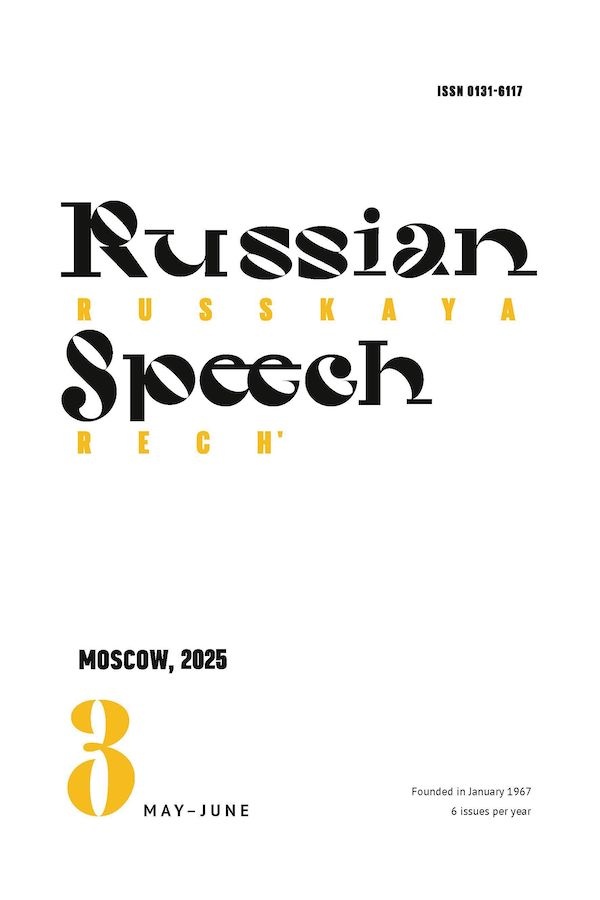Combination of words dusha (‘soul’) and prilepit’sya (‘adhere’): conceptualization of soul representations in Russian linguistic worldview
- 作者: Leontyeva T.V.1
-
隶属关系:
- Ural Federal University named after the First President of Russia B. N. Yeltsin
- 期: 编号 3 (2025)
- 页面: 37-47
- 栏目: Issues of Modern Russian Language
- URL: https://consilium.orscience.ru/0131-6117/article/view/688665
- DOI: https://doi.org/10.31857/S0131611725030024
- ID: 688665
详细
This article contributes to the study of the naïve linguistic image of the soul through an analysis of word combinability. One of its components in Russian Linguistic Worldview is the notion of the soul’s inclination towards unity with other souls. This aspect of contextual figurative semantics concerning the word in question has been inadequately addressed in the scholarly literature. The study analyzes 54 instances of the the word dusha (‘soul’) combined with the verb prilepit’sya (‘adhere’). The article uses Russian National Corpus as a source of material. The image derived from the physical world (the adhesion of wet, sticky substances) denotes a high degree of closeness between objects, while in a figurative sense, it signifies strong attachment. Two variants of combinations are found in the texts: dushoy prilepit’sya (‘adhere with the soul’) and dusha prilepilas’ (‘the soul adhered’) (to someone, to something). The semantics choosing another person is embodied in descriptions of friendship and romantic attachment, spiritual closeness between a mentor and a junior companion, loyalty of servants to their masters, and the overcoming of class distinctions. The soul serves as the primary measure against which individuals evaluate themselves and other objects, not limited to surrounding people. Among other objects, besides human beings, whose selection is influenced by the soul are faith, geographical location, endeavor, idea, and activity that may become an object of temptation and captivate the soul.
全文:
作者简介
Tatyana Leontyeva
Ural Federal University named after the First President of Russia B. N. Yeltsin
编辑信件的主要联系方式.
Email: t.v.leontieva@urfu.ru
俄罗斯联邦, Ekaterinburg
参考
- Anglin S. M. [I think, therefore I am? Examining conceptions of the self, soul, and mind]. Consciousness and Cognition, 2014, vol. 29, pp. 105–116. (In Eng.)
- Apresyan Yu. D. (ed.). Novyi obyasnitelnyi slovar’ sinonimov russkogo yazyka [New explanatory dictionary of synonyms of the Russian language]. Moscow, Languages of Slavic Culture Publ., 2003. 488 p.
- Azadovsky K. M. [Is “Russian melancholy” translatable?]. Shagi-Steps, 2020, no. 6 (3), pp. 170–183. (In Russ.)
- Blessed Augustine. Ispoved’ [Confession]. St. Petersburg, Nauka Publ., 2013. 376 p.
- Dementyev V. V. Kommunikativnye tsennosti russkoi kul’tury: kategoriya personal’nosti v leksike i pragmatike [Communicative values of Russian culture: the category of personality in vocabulary and pragmatics]. Moscow, Global Com Publ., 2013. 338 p.
- Evgenyeva A. P. (ed.). Slovar’ russkogo yazyka. T. 3 [Dictionary of the Russian language. Vol. 3]. Moscow, Russkii Yazyk Publ., 1999. 752 p.
- Kabakova G. I. [The soul as an organ of assessment and assessment of the soul]. Anthropologiczno-jezykowe wizerunki duszy w perspektywie miedzykulturowej, tom trzeci: aksjosfera duszy — dusza w aksjosferze. Warszawa, Instytut Slawistyki Polskiei Akademii Nauk Publ., 2018, pp. 57–72. (In Russ.)
- Makarovska O. [The value of the human soul in the mirror of (de)motivational posters]. Anthropologiczno-jezykowe wizerunki duszy w perspektywie miedzykulturowej, tom trzeci: aksjosfera duszy – dusza w aksjosferze, Warszawa, Instytut Slawistyki Polskiei Akademii Nauk Publ., 2018, pp. 325–344. (In Russ.)
- Natsional’nyi korpus russkogo yazyka [Russian National Corpus]. Available at: http://ruscorpora.ru/ (accessed 12.08.2021).
- Radbil T. B., Akhmetzhanova G. A., Zhumagulova Z. Zh., Seralieva A. E., Seralieva G. E. [DUSHA (“SOUL”) and TELO (“BODY”) in the Aspect of Contrastive Analysis of Cultural Concepts: Materials for the Linguo-Cultorological Phraseological Dictionary of Russian-Kazakh Correlations]. Nauchnyi dialog, 2020, no. 3, pp. 127–150. (In Russ.)
- Russo M. M. [Disappearing and Emerging Organs]. Lingvistika i metodika prepodavaniya inostrannykh yazykov (Elektronnoe nauchnoe izdanie) [Linguistics and Methods of Teaching Foreign Languages (Electronic Scientific Publication)], Moscow, Institute of Linguistics of the Russian Academy of Sciences Publ., 2013, vol. 5, pp. 173–199. (In Russ.)
- Uryson E. V. [Spirit and Soul: Towards the Reconstruction of Archaic Concepts of Man]. Logicheskii analiz yazyka. Obraz cheloveka v kul’ture i yazyke. Moscow, Indrik Publ., 1999, pp. 11–25. (In Russ.)
- Uryson E. V. Problemy issledovaniya yazykovoi kartiny mira: Analogiya v semantike [Problems of Studying the Linguistic Picture of the World: Analogy in Semantics]. Moscow, Languages of Slavic Culture Publ., 2003. 224 p.
- Vezhbitskaya A. Semanticheskie universalii i opisanie yazykov [Semantic universals and description of languages]. Moscow, Languages of Slavic Culture Publ., 1999. 780 p.
- Vezhbitskaya A. [Russian cultural scripts and their reflection in the language]. Russkii yazyk v nauchnom osveshchenii, 2002, no. 2 (4), pp. 6–34. (In Russ.)
- Zaliznyak A. A., Levontina I. B., Shmelev A. D. Klyuchevyye idei russkoi yazykovoi kartiny mira [Key ideas of the Russian language picture of the world]. Moscow, Languages of Slavic Culture Publ., 2005. 554 p.









